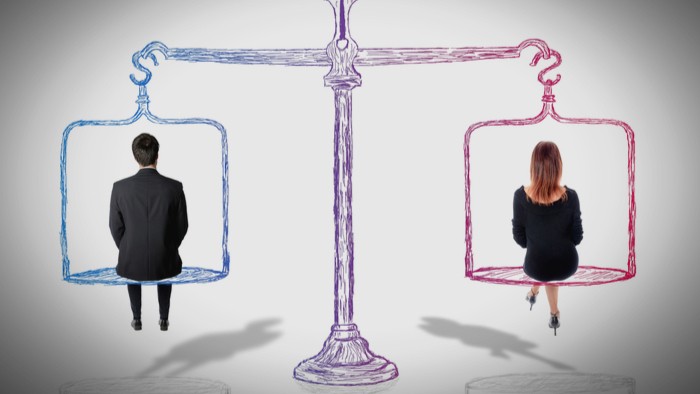
Gender Justice and its various forms under Indian Constitution

INTRODUCTION
India has long been regarded as one of the world’s most unequal and unsympathetic to gender issues. This is especially true for women, who are relegated to subservient status and subjected to a variety of societal problems such as infanticide, foeticide, child marriage and gender prejudices in the rights of coparcenary property, etc.
Our country has been unable to free itself from the shackles of outdated social practices and traditions, even in the 21st century, when the entire globe has awakened to feminism’s appeal. In a kin-ordered social structure, India remains the most important component of the patriarchal belt of the world, where women are still inferior to men. The framers of the constitution believed that Indian women should be treated equally and that the state should protect their rights, thus they included provisions to protect women’s interests and to achieve gender justice.[1]
GENDER JUSTICE UNDER INDIAN CONSTITUTION
The Indian Constitution has provided new dimensions to Indian society. The term “gender” is not used in the Constitution. Instead of ‘Gender’ they used the word ‘sex’.In Articles 15 (1), 16 (2), and 325, which prohibit discrimination based on sex, the word ‘sex’ is used. Although the term ‘sex’ has a narrower connotation than the term gender.
Discrimination based on sex, colour, creed, caste, race, religion, and other factors has been prohibited under the constitution as they are violative of Fundamental Rights[2]. In a similar vein, Article 14 of the Constitution guarantees equality before the law, while Articles 15 and 16 eliminate prohibitions or discrimination based on religion, race, caste, sex, or place of birth, among other factors, and provides the state guidance to establish provisions for women and children. Our constitution, interestingly, gives the state the authority to make particular provisions for the protection and development of women and children. From time to time, a slew of laws has been established to empower them and elevate their status.
PROVISIONS UNDER THE INDIAN CONSTITUTION TO MAINTAIN THE GENDER JUSTICE
The Indian Constitution’s framers were aware of women’s oppressive and discriminatory standing in society, so they took extra care to ensure that the state took proactive actions to ensure their equality. Articles 14, 15(2), 15 (3), and 16 of the Indian Constitution thus not only prohibit discrimination against women but also provide the state with the authority to grant protective discrimination in their favour in proper circumstances. These provisions are part of the Fundamental Rights under the Indian Constitution.[3]
The preamble of the Indian Constitution guarantees social, economic, and political justice, as well as equality of status and opportunity and individual dignity.
The fundamental rights guarantee gender equality under the law; Articles 14 and 15 prohibit the state from discriminating based on sex; and Article 15(3) states that nothing in this Article prevents the state from making particular arrangements for women and children.
Article 16 (1) ensures equal opportunity for all citizens in matters relating to employment or appointment to any state office, and Article 16 (2) prohibits discrimination in employment or appointment to any state office based solely on religion, race, caste, sex, or other factors. Article 23 establishes the right to equality, as well as special provisions, such as the prohibition of discrimination based on religion, colour, sex, or other factors, as well as the prohibition of exploitation.[4]
Part IV of the Indian Constitution contains the Directive Principles, which are no less important in state government and require, among other things, that the state shall strive to ensure gender equality. Articles 39(d) and 41 of the Indian Constitution recognized the principles of “Equal Pay for Equal Work” for men and women, as well as the “Right to Work.”
These all provisions provide various rights and privileges to the people to achieve Gender Justice.
CONCLUSION
India is a land of laws that governs every aspect of human life. Even though, we have not been able to eradicate some of our society’s ills, including gender-based crimes and cruelties towards women. Despite the fact that the constitution has a large number of provisions to preserve gender justice and equality, they have all been rendered ineffective owing to a variety of causes.
India’s majority of laws did not have the desired effect because people’s willingness to change society to give women equality was lacking, so education, seminars, and other social instruments should be used to create a strong public opinion to give women their due place in society. In order to give women their due place in society, strong public opinion should be created through education, seminars, and other social instruments.
Women are guaranteed equal rights and opportunities, but the reality is much different. Why don’t people realize that women are equal to males in every way and that their energy and valour can demonstrate that no one should underestimate them?
The fundamental responsibility of those fighting for gender equality will be to educate both men and women about the issue. The law can, at most, catalyze a movement for change in public opinion, societal attitudes, and values. Legislation and legal prescriptions alone will not be enough to influence people’s beliefs. India requires a new change that promotes humanism and respect for individual dignity and liberty.
To improve the status of women in society, laws must be enacted, but they must be backed by strong public willingness and opinion because laws will not be able to achieve their goals as long as conservative social thinking remains deeply rooted in society. It must be stated that social reforms in social thinking, behaviour, and law will only be effective if a significant portion of society supports them.
REFERENCES
- The Constitution of India
- M.P Jain, Indian Constitutional Law
- www.heinonline.org
- constitutionofindia.net
- www.legalserviceindia.com
[1] Narendra Nagarwal,’ Gender Justice Ideology and the Indian Constitution: Analysing Equality Rights’ HeinOnline, available at<https://scholar.google.com/scholar?hl=en&as_sdt=0%2C5&q=gender+justice+under+constitution&oq=#d=gs_qabs&u=%23p%3DGxAvKdsckLoJ>(Last visited on 15 August 2021)
[2] The Constitution of India
[3] M.P. Jain, Indian Constitutional Law 409 (Lexis Nexis, 8th ed.,2018).
[4] Constituent Assembly Debates on April 29, 1947, available at: https://www.constitutionofindia.net/constitution_assembly_debates/volume/3/1947-04-29 (last visited on 15 August 2021).







